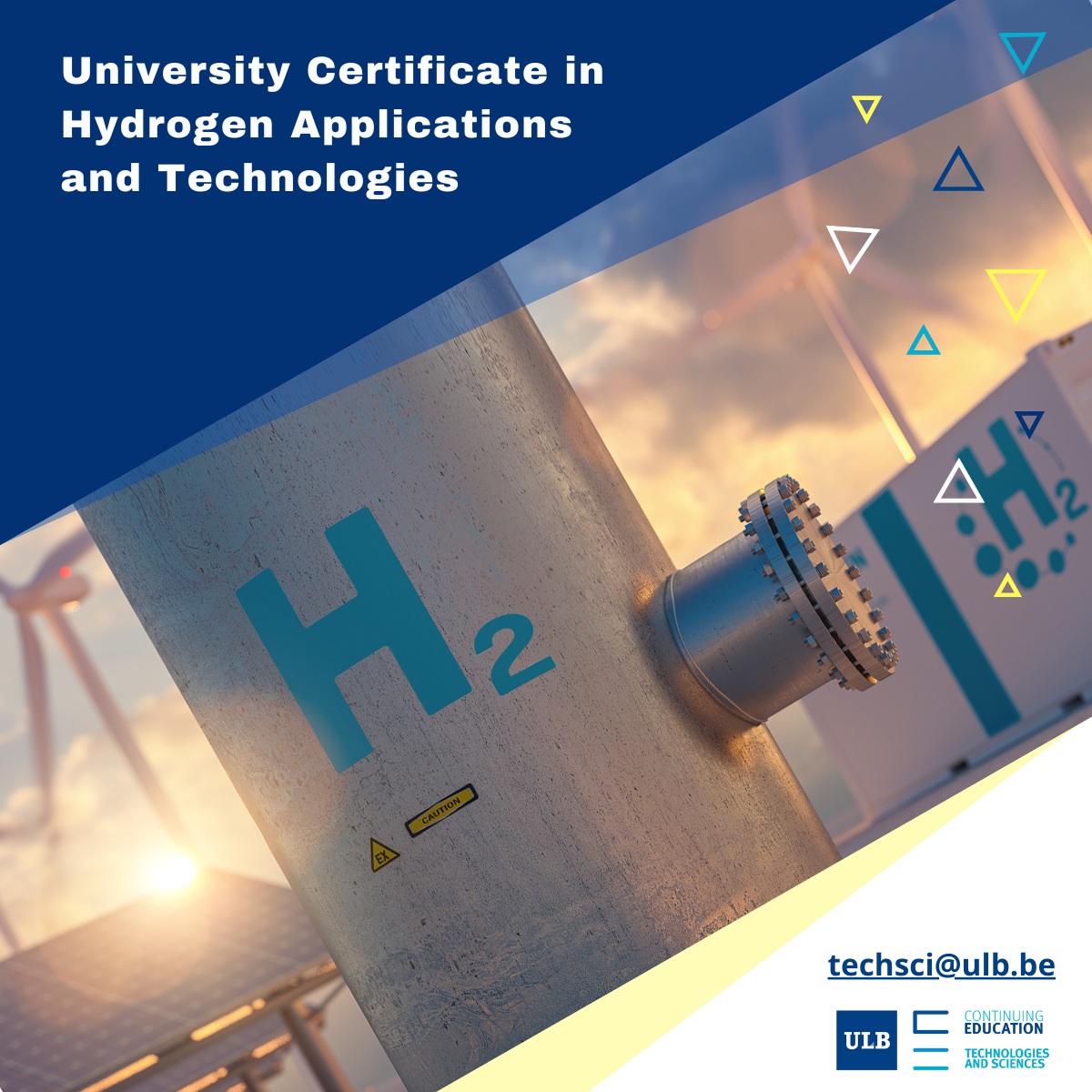Build your expertise in hydrogen technologies and applications - one focus training at a time.
Become certified on topic and position yourself at the heart of the energy transition.
Build your expertise in hydrogen technologies and applications - one focus training at a time.
Become certified on topic and position yourself at the heart of the energy transition.
formation continue
Programme durationshort (2 to 5 days), long (more than 15 days)
Learning language(s)english
Schedule typeDaytime
CampusSolbosch
Category(ies) - Topic(s)Sciences and technics - Sciences and technics/Sciences and technics - Sciences
Organising faculty(s) and university(ies) Open to returning studentsyes
PricesIntroduction to the hydrogen value chain
(2 half days) – €500.00
Hydrogen technologies
(4 half days) – €1,000.00
Hydrogen applications
(7 half days) – €1,750.00
Hydrogen safety, legislation & permitting
(2 half days) – €500.00
Labs and Technical Visits
(3 half days) – €500.00
Learners who follow the full training pathway, including all focus trainings, the project work, and the final defenses, are eligible to obtain the university Certificate, subject to successful completion of all requirements.
Full program registration fees:
Regular fee: €3,900.00
Reduced fee – ULB alumni / ULB staff: €3,300.00
Reduced fee – Group rate
(minimum 2 participants from the same company): €2,900.00
Reduced fee – Students / Unemployed: €2,900.00

SEVERAL FORMATS :
onsite (online attending upon request and motivation only)
modular / full program
Participants attending online or registering module by module benefit from high-quality training content but cannot obtain the Certificate, which is reserved exclusively for those following the full on-site program, including lab visits and project defense.
This program is designed for professionals and future experts who want to actively engage in the hydrogen transition and develop concrete, market-ready skills.
You will recognize yourself if you are:
A professional engineer or scientist looking to transition into hydrogen systems
A graduating engineer or science master’s student eager to explore opportunities across the hydrogen value chain
An industrial or environmental manager working in energy-related sectors and seeking hydrogen expertise
An institutional professional, policymaker, or expert involved in the development of energy and climate policies
A hydrogen enthusiast or career changer motivated to build skills and secure opportunities in this rapidly expanding sector
Whether you aim to upskill, respecialize, or lead projects in hydrogen, this program provides the knowledge, hands-on experience, and recognition to support your ambitions.
In these trainings, you will dive into hydrogen as a flexible energy carrier and explore its potential as a renewable fuel across multiple domains and applications. You will engage directly with real-world case studies through academic courses, technical site visits, and seminars led by experts, giving you hands-on insight into the hydrogen value chain. You will also develop a practical understanding of safety considerations, ensuring you leave equipped to apply this knowledge confidently in your own work.
As part of the European Hydrogen Strategy, Europe is investing considerable sums in hydrogen-related projects, leading to an increased need for trained hydrogen workers and therefore an increased need for training programmes.
This lifelong learning program leading to an ULB certificate, aims to contribute filling in this gap. ULB has renowned hydrogen experts among its staff, actively conducts hydrogen research, has hydrogen related equipment, and has also a vast network of hydrogen related partners and consortiums.
Europe has set its sails for a journey towards a low-carbon, zero-emission energy future. To become climate-neutral by 2050, the European energy system is facing an important energy system transition. Renewable and low-carbon gases, such as hydrogen (H) have been attributed a central role in this transition [6].
Hydrogen - with atomic number 1 - is the lightest, simplest and most abundant element in the universe known. At the same time hydrogen has a highly multifaceted and versatile nature. It makes up the largest part of the sun and gaseous planets, and occurs naturally on earth in compound forms, such as the hydrocarbons found in natural gas, coal and petroleum. Hydrogen can be used as energy carrier to store energy, which upon release has a remarkably clean byproduct, since hydrogen in reaction with oxygen merely gives water. Producing hydrogen, storing hydrogen, transporting hydrogen, and applying hydrogen energy systems are all research & innovation areas in expansion.
This website uses Google Analytics. By clicking on "I accept" or by navigatin on it, you authorize us to deposit a cookie for audience measurements purposes.
You have accepted the deposit of audience measurement cookies in your navigator.
You have declined the deposit of audience measurement cookies in your navigator.
"Do Not Track" is enabled in your browser. You cannot allow statistics collection.